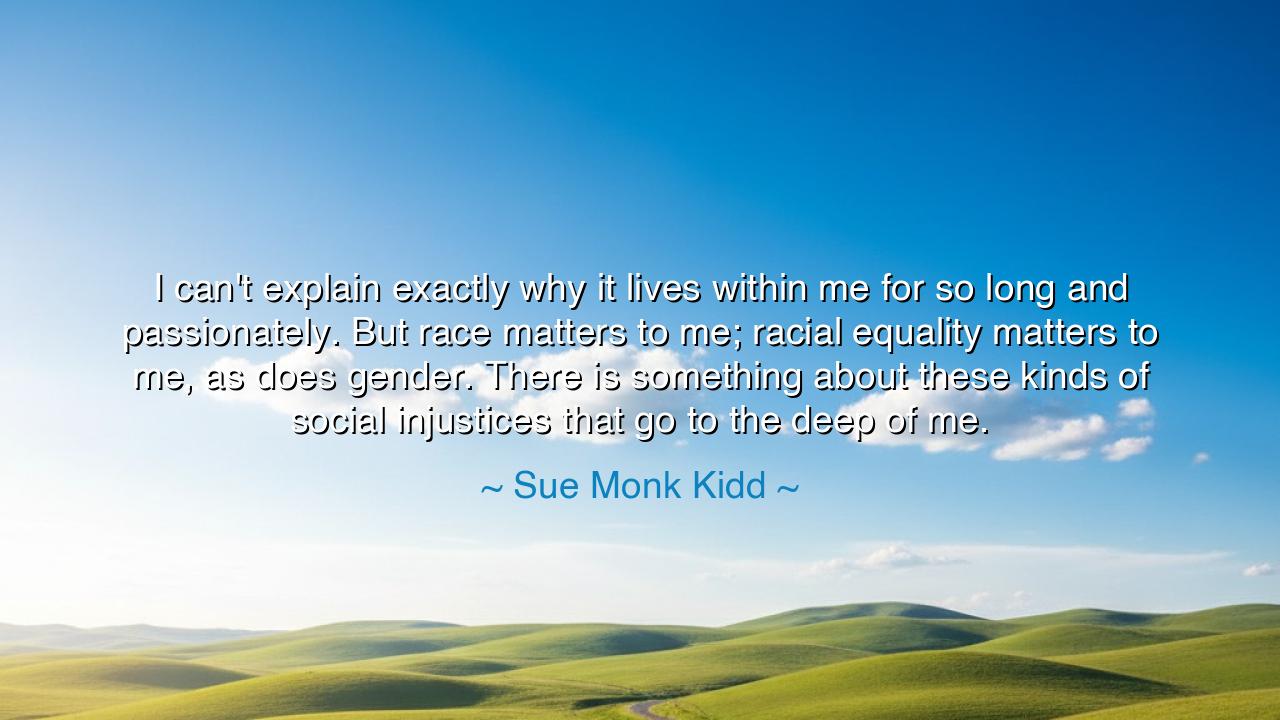
I can't explain exactly why it lives within me for so long and
I can't explain exactly why it lives within me for so long and passionately. But race matters to me; racial equality matters to me, as does gender. There is something about these kinds of social injustices that go to the deep of me.






Sue Monk Kidd’s words strike with the quiet thunder of the soul: “I can’t explain exactly why it lives within me for so long and passionately. But race matters to me; racial equality matters to me, as does gender. There is something about these kinds of social injustices that go to the deep of me.” In this confession we hear the timeless cry of the human heart when it beholds oppression. She does not speak as one detached, observing from afar, but as one pierced in her innermost being, stirred by a fire that refuses to be extinguished. For there are wrongs so profound that they resonate in the marrow of humanity itself, calling us to act, to remember, to resist.
The ancients often spoke of a divine spark placed within each person—a flame that responds when injustice darkens the world. Kidd’s testimony is a witness to this truth. She admits she cannot explain it fully, yet she feels it powerfully, as though her spirit were forged for this purpose: to bear the weight of inequality, and to speak against it. The matters of race, of gender, of social justice, are not abstract to her. They are living forces that demand reckoning, not tomorrow, not someday, but now. For when justice is denied to one, it is denied to all, and the wound spreads across the body of humankind.
History confirms her words with unshakable evidence. Recall the story of Harriet Tubman, who, born into slavery, refused to accept the discourse of chains. She could not explain why the fire lived in her so fiercely, why she risked her life again and again to free others. Yet something within her—something deep and eternal—commanded her forward. Race mattered to her, equality mattered to her, and injustice seared her very core. She became the “Moses” of her people, not because she sought glory, but because the pain of injustice was unbearable to her spirit. In Tubman, as in Kidd, we see the same truth: that when injustice penetrates the soul, silence is no longer possible.
But Kidd also touches on a mystery. Why does one person feel this fire so intensely, while another turns away indifferent? The ancients might say it is the stirring of conscience, the voice of the divine whispering in the heart. When injustice is witnessed, some bury the discomfort, but others—like Kidd—allow it to bloom into passion. This passion, if guided by wisdom, becomes a force for change; if ignored, it becomes a torment within the self. The lesson here is that we must not fear this inner fire, but embrace it, for it is the mark of a soul aligned with truth.
Her mention of gender reminds us that oppression wears many faces. Just as chains of race have bound millions, so too have the silent chains of gender limited, diminished, and silenced voices across centuries. Consider the suffragists of the nineteenth and early twentieth centuries—women who endured ridicule, prison, and violence simply to demand the right to vote. Their fire too “lived within them” long and passionately, as Kidd describes. They could not ignore the injustice; it ate at them until their words became speeches, their speeches became movements, and their movements became history.
The teaching here is plain yet profound: allow yourself to be pierced by injustice. Let the cry of the oppressed enter your soul until it is impossible to remain still. Then act—not always with grand gestures, but with steady ones. Speak when silence would protect you. Stand when others sit in comfort. Defend those whom society ignores. For Kidd reminds us that some wrongs reach into the deepest part of us, and it is in honoring that pain that we discover our truest humanity.
Therefore, take practical steps. Educate yourself about the injustices that surround you. Listen deeply to those who suffer, without pride, without dismissal. Support causes of racial equality and gender justice not only with words, but with deeds—through your vote, your labor, your resources, your daily choices. Teach your children that every soul carries equal worth, that liberty is not a privilege but a birthright. In so doing, you turn passion into action, and action into transformation.
Thus, Sue Monk Kidd’s words are more than personal—they are prophetic. She names what many feel but few dare to say aloud: that social injustice is not only a wound upon society, but a wound upon the very soul of the one who perceives it. If we listen, if we respond, we become part of the healing. And if we do not, the wound festers, and all of humanity suffers. Let us then, like Kidd, embrace the fire within, and allow it to guide us toward the light of equality and freedom.






AAdministratorAdministrator
Welcome, honored guests. Please leave a comment, we will respond soon